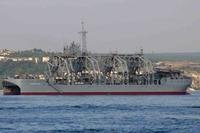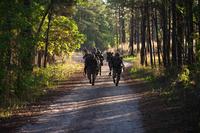A U.S. special operations team member was killed and two others wounded Thursday in a raid against the al-Shabab terror group in Somalia, U.S. Africa Command said Friday.
The combat fatality was the first in Somalia for U.S. forces since the "Black Hawk Down" incident of 1993 in which the bodies of U.S. service members were dragged by mobs through the streets of Mogadishu, AfriCom said.
The service member killed in the raid on a compound of al-Shabab, which has links to al-Qaida, in Barii -- about 40 west miles of the capital of Mogadishu in the Shebelle region -- was believed to be a Navy SEAL, numerous news outlets reported.
Navy Capt. Jeff Davis, a Pentagon spokesman, said the special operations troops were on an advise-and-assist mission with an assault force from the Somali National Army that was lifted to the target area by U.S. rotary aircraft.
Davis said the al-Shabab ("The Youth") compound "had been associated with some attacks on facilities that we use and that our Somali partners use nearby."
The U.S. special operations team was "some distance back" when the attack began, Davis said, but they apparently were hit with small-arms fire, killing one and wounding two others. There was no immediate word on the conditions of the wounded, or on casualties for the Somali force.
U.S. forces have been working with the Somali National Army to counter al-Shabab since 2013 with the goal of "degrading this al-Qaida affiliate's ability to recruit, train and plot external terror attacks throughout the region and the United States," Davis said.
Somalia, on the Horn of Africa, has been in turmoil, wracked by periodic drought and famine amid infighting among various warlords and terror groups, since the fall of the dictator Mohamed Siad Barre in 1991.
The U.S. and the international community intervened in 1991 to end a famine, but their presence came to an end after two Black Hawk helicopters were shot down in 1993 and 18 U.S. troops were killed in the "Battle of Mogadishu" against so-called "technicals" who sped through the streets in pickups.
AfriCom spokesman Patrick Barnes told The Associated Press, "We do not believe there has been a case where a U.S. service member has been killed in combat action in Somalia since the incident there in 1993."
The U.S. is believed to have about 50 service members in Somalia to advise and assist local forces and coordinate with the African Union Mission in Somalia (AMISOM) peacekeeping force, comprised mostly of Kenyan troops.
AfriCom announced last month that it was sending sending "dozens" of additional troops to Somalia to assist the Somali National Army and AMISOM.
In its statement Friday, AfriCom said the operation against al-Shabab was undertaken to diminish the threat the group "presents to Americans and American interests."
AfriCom said al-Shabab is an affiliate of al-Qaida, which "has murdered Americans; radicalizes and recruits terrorists and fighters in the United States; and attempts to conduct and inspire attacks against Americans, our allies and our interests around the world, including here at home."
In March, Marine Gen. Thomas Waldhauser, the AfriCom commander, was in Washington, where he asked for and was later granted by President Donald Trump and Defense Secretary Jim Mattis more "flexibility" to conduct operations against al-Shabab without going through the White House National Security Council.
At a Pentagon news conference in late March, Waldhauser said additional flexibility on the rules of engagement would accelerate the campaign against al-Shabab, but "we are not going to turn Somalia into a free-fire zone."
Waldhauser said he was seeking "a little bit more flexibility" to "allow us to process targets in a more rapid fashion" by giving field commanders the authority to order strikes by drones and manned aircraft rather than going first to the top of the chain of command.
The added authority could bolster the new government of President Mohamed Abdullahi Mohamed, a dual Somali and U.S. citizen who holds a masters degree in political science from the University of Buffalo and was a housing commissioner in Buffalo before returning to Somalia.
"We continue to support our Somali and regional partners to systematically dismantle this al-Qaida affiliate, and help them to achieve stability and security throughout the region as part of the global counterterrorism effort," the AfriCom statement said.
At a breakfast with defense reporters in March, Waldhauser said the additional authority he was seeking would have to be used cautiously amid the famine and drought now sweeping the Horn of Africa.
He said AfriCom would have to coordinate closely with relief agencies to avoid hitting civilians on the move in search of food and water.
"We need to have good communications," Waldhauser said. "You need to be very, very careful in terms of certainty" before approving strikes by manned or unmanned aircraft.
The drought in Somalia, where locals report that it has rained only twice in the last two years, threatens three million lives in a nation of 10-12 million, according to the United Nations.
Newly installed Somali President Mohamed has pledged to rout al-Shabab while also calling on members of the group to surrender.
At his inauguration in February, Mohamed said, "To those who work with al-Qaida, al-Shabab and IS [Islamic State], your time is finished. You have been misled, destroyed property and killed many Somalis. Come and we shall give you good life."
The raid Thursday against al-Shabab came a day after Abdullahi Sheikh Siraji, Somalia's 31-year-old public works minister who was considered to be a rising political star, was shot and killed by government security forces in what may have been a case of mistaken identity.
Siraji was gunned down inside his car Wednesday in the capital. A Mogadishu official told Reuters that security forces "opened fire" on the vehicle "by mistake."
-- Richard Sisk can be reached at Richard.Sisk@Military.com.





























